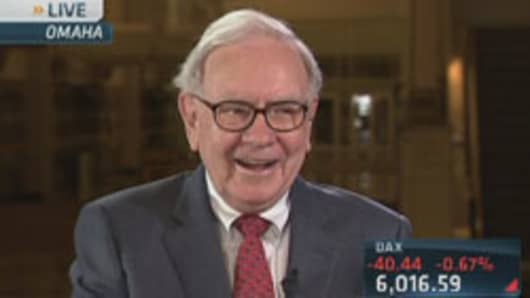ANDREW: Let's get back to Becky in Omaha with the "Oracle of Omaha." Becky.
BECKY: Hey, thanks, Andrew. You know, we've been talking about a lot of different things, and we've been asking for your questions coming into the Squawk email box and coming to the Squawk Twitter feed, which I'm still trying to learn. I think it's @squawkcnbc.
But, Warren, we did get some questions that have already been coming in through the weekend on that. And I want to bring you one that comes from @bigskywalker. He asks the question--I'm assuming it's a he, it could be a she. "Why do events like MF Global continue to happen? And are the penalties too light for the officers and directors?"
BUFFETT: Yeah, the penalties are too light. They--they'll always happen. I mean, as long as human beings run institutions, including financial institutions, there will be people that take undue risks, there will sometimes be people that steal, there will be--you know, there will be people that don't understand the risks they're taking. It's just the nature of business. That happens with small businesses, it happens with big businesses. There should be--and I've written--I put this in the annual report--there should be much more extreme penalties for the CEOs, or the departing CEOs, of companies that are important enough to require society to intervene. The idea that huge institutions fail and the taxpayers have to--their representatives have to rush in and that royal markets and all of that sort of thing. And the CEOs walk away rich is, I think--I think it's--I think it's a terrible thing morally; but, beyond that, I think it encourages bad behavior. You don't have to worry--the moral risk does not come about with the shareholders of you name the institution, whether it's WAMU or Wakovia or Freddie...
BECKY: Mm-hmm.
BUFFETT: ...or Fannie. They shareholders get creamed, but the managers walk away rich. And there should be strong changes made in my view. I don't think anybody that runs an institution that needs the government to intervene later on for, for society's sake, I don't think any of them should walk away with a dime.
BECKY: With the case of MF Global in particular, is this entirely Jon Corzine's fault?
BUFFETT: I don't know. I mean somebody made a big bet. I would say this. If you have an institution that has a net worth of a billion and some of that's in furniture and fixtures and some of that's--I looked up their 10K, and they--and you take a position of six billion so that--in a--in a credit that could run into big trouble I--it certainly--you know, that's a risk that shouldn't be taken.
BECKY: Why didn't the New York Federal Reserve Bank stop them? I mean, this is a primary broker. This was a primary broker. Why weren't the regulators more on top of this and after what we went through in 2008?
BUFFETT: Well, to some extent, they're making the same mistake that regulators have made all over the world about sovereign debt. Sovereign debt is pretty generally regarded as risk-free, and that's why the European banks loaded up on it. They didn't have to count it for capital requirements, and it was a way they could leverage up further without having the leverage rules called into play. And sovereign debt still represents a promise to pay. And if you've got a promise to pay by somebody that doesn't have a printing press, sovereign--you know, you can have problems. And when you've got a printing press, you know, you can pay your debts. If you ever have a printing press, don't give it up, Becky. But if you don't have one, be careful about how much money you borrow. And the regulators in my view were very lax in terms of just regarding all sovereign debt as terrific, even when the spread started widening out.
BECKY: Andrew, I know you've got some questions on this. I have some more questions on this topic, too. But I think we're coming up against a hard break, and I think we've got that top of the hour to hit.
ANDREW: Yeah.
BECKY: I know we have a lot more to talk about with this, too. Plus, today is the day, Warren, that you've got to file your SEC filings to talk about what you've been buying. I know that you bought about $7 billion worth of equities last quarter, and we're going to ask you about that when we come back, too.
BUFFETT: Yeah, it'll be an interesting answer, and we'll have a little quiz maybe for Joe and Andrew.
BECKY: All right. Guys.
ANDREW: Hey, thanks, Beck. We are going to slip in that break and we're going to have more with Warren Buffet. Plus, today's top stories, and the latest out of Rome. Squawk Box coming back right after this.
PART FOUR: BUFFETT ON OCCUPY WALL STREET AND THE 'HAROLD' HINT
Current Berkshire stock prices:
Class B:
Class A:
For more Buffett Watch updates follow alexcrippen on Twitter.
Email comments to buffettwatch@cnbc.com




